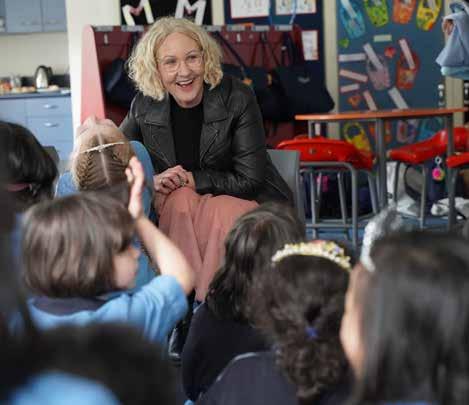
3 minute read
From The Principal
Thinking about OUR thinking
Many years ago, I was taking a professional development session for a school and we were focusing on how students learn best. I asked the audience who knew what metacognition was, and the vast majority put up their hands. Then I casually asked the obvious question, “Can anyone describe briefly what metacognition means?” All the hands slowly went down, along with heads (all teachers know making eye contact is always fraught with danger at question time).
Naturally, the slowest to look away got asked the question and I was met with silence. We all kind of knew what metacognition was, but I know there was not a common understanding for that group of teachers about what the word meant in practice.
We need both a common language of learning and the deliberate use of metacognitive practices by teachers and learners.
The International Baccalaureate have recently published their own paper about the importance of teaching metacognitive skills. When we are confident to use metacognitive strategies, we are open to the concept that we may have made an error or see something differently and we should welcome that. When we have trust and dialogue between learners and teachers, engaging in these practices encourages self-efficacy, a growth mindset, and the belief that there is always more that we can do to add to our understandings. Some actions your daughter can engage in with their learning or study are:
• Always, always, always make a plan before beginning to write a response, especially if it is a longer answer. A handwritten piece is not able to be altered with the back button. Reduce the likelihood of stress by planning the order of your work. Trust me, it is easier and more time efficient to do the plan at the start.
• Rehearse and memorise key facts. Like learning sports, music, and drama lines, you should use the same drills in Science and Mathematics – in fact, everything.
• Self-monitor – be rigorous in asking if you are tracking well and are you where you should be? Do you believe you have any gaps, and if so, what are you doing to fill the gaps?

Celebrating the Queen’s birthday with Year 1
Here at QMC, it is not only the learners who engage in metacognitive activities.
In the past 18 months, we added a new lens for the teachers; IRIS Connect. IRIS Connect allows teachers to see themselves as students do by experiencing their classes through videos of themselves engaging in the art/ science of teaching. We call this microteaching, and this practice is a game-changer for teachers to get a microscope-view on our teaching.
Collaboration is vital for our profession and tools such as IRIS provide the opportunity for new discussions with each other. The feedback from our trial has been overwhelmingly positive.
““ I used IRIS this week on my phone and then I edited a video clip which is part of my appraisal. I LOVE the technology and am super excited about the possibilities surrounding it” and “simple, easy to use and totally under your control as to how you share and with whom. An absolutely outstanding tool for PLD” are examples of the feedback we have received from teachers.
Ms Young with Year 13s at Athletics Day So back to that thinking about your thinking.

Metacognition is an essential part of teaching and learning. The skills of self-regulation and agency are built up through willingly scrutinising ourselves as both learners and teachers.
As the IB paper says:
Promoting metacognition is less about finding the perfect policy, practice, or program and more about creating a culture of teaching and learning that produces thoughtful and reflective students who are prepared and motivated to engage in independent, lifelong learning. The insights and lessons learned from the research provided in this policy paper can help teachers and school leaders take small steps toward creating a school culture and learning environments that cultivate metacognition for all learners.
Jayne-Ann Young Principal
Beach, PT, Anderson, RC, Jacovidis, JN, and Chadwick, KL. 2021. Making the abstract explicit: The role of metacognition in teaching and learning. Bethesda, MD, USA. International Baccalaureate Organization.










